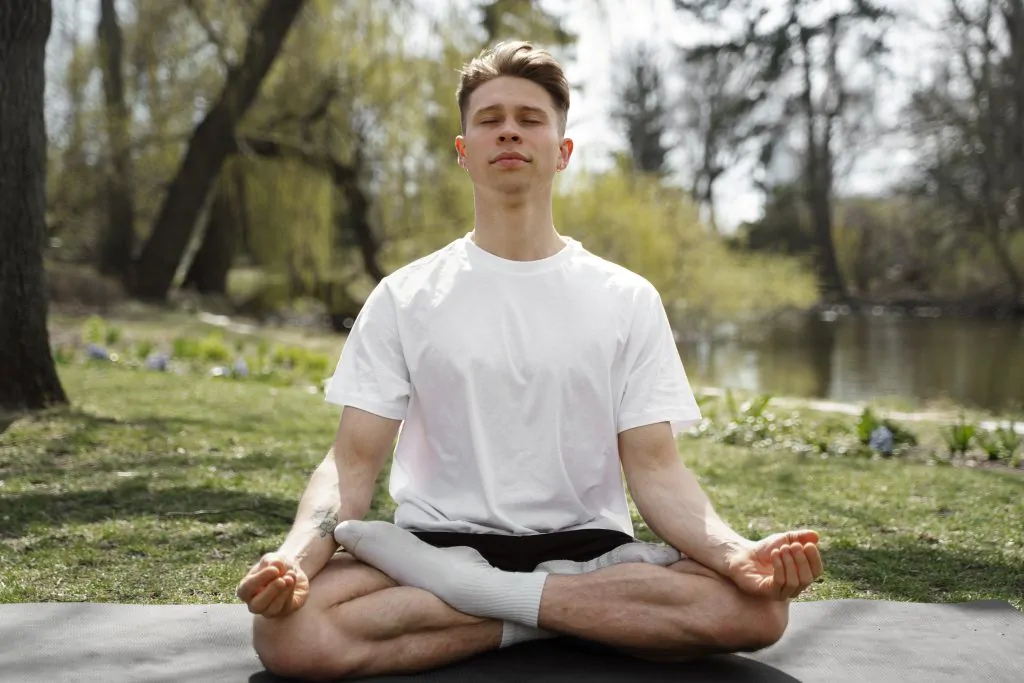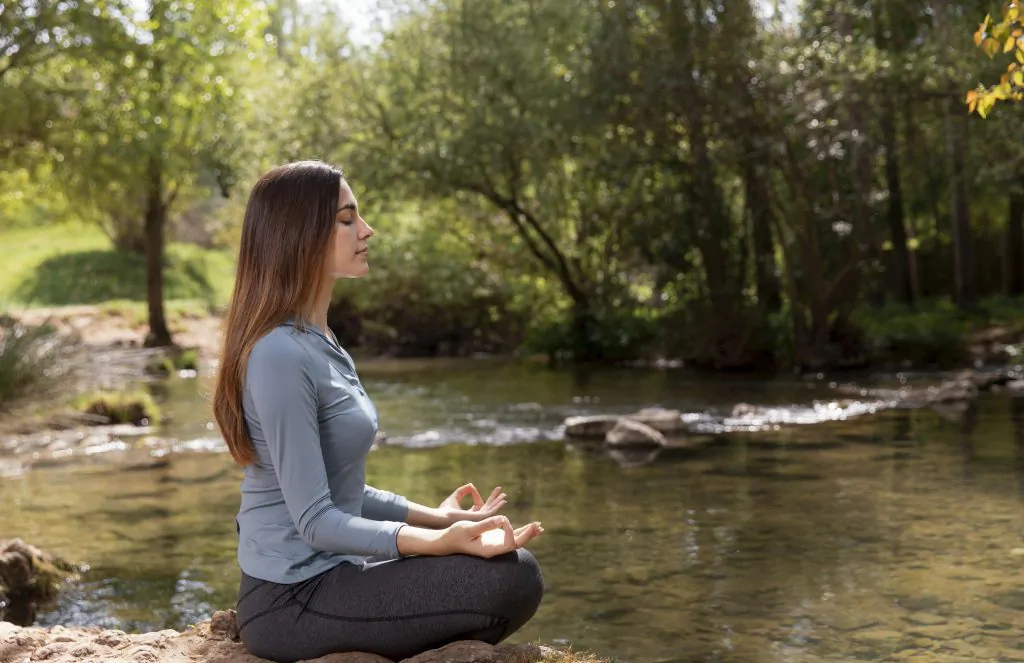To deal with anxiety means to exercise some good practices that help you feel less anxious and improve your mood. Serious anxiety issues should be dealt with in the hospitals by professionals. It is common to occasionally feel anxious, but individuals with anxiety disorders frequently and excessively feel fear, despair, and distress in typical settings. If these emotions interfere with your ability to operate regularly and lower your quality of life, they are unhealthy.
Everyone is eventually impacted by stress and worry. There are techniques to handle anxiety, even if it seems out of control, even though they can present themselves in multiple ways for different people and at different levels. This article talks about some of the ways to deal with anxiety.
Ways to Deal with Anxiety (In the moment),
Understanding anxiety and stress is greatly aided by knowledge of its causes and treatments, but there are also some mental and physical actions you may do when experiencing these emotions. Some mechanisms to deal with anxiety are :

1. Breathe
Consider moving to a quieter area. If it is safe, some people feel that closing their eyes reduces stimulation. If not, look for anything on which to concentrate. Inhale deep through your nose. After holding it for a moment, exhale via your mouth. To assist you to ensure you are breathing deeply enough, place a palm on your tummy. You ought to be able to experience it expanding at inhalation and contracting with exhalation. Repeat until you start to feel calmer, as many times as necessary.
2. Listen To Music You Prefer
Music is always utilized to explain ideas that are difficult to put into words and to cure the body and spirit since the dawn of civilization. According to Colbie Caillat “ A great song should lift your heart, warm the soul and make you feel good. “ Make a playlist of really calm songs or just music which you would listen to when you are really angry. The production of dopamine increases by listening to music. Anxiety and depression symptoms are lessened because of the enhanced dopamine production. There is a region of our brain which is involved in our mood and emotions known as amygdala. This region directly processes music and helps improve our mood.

In a longer term, as well as enhancing mood and allowing for easier emotional expression, music may also reduce pain and anxiety. According to research, music has several advantages for both our mental and physical health.
3. Go For A Walk
One of the finest anxiety treatments, both short-term and long-term, is exercise. Muscle tension is relieved and worries are diverted by taking a walk. Grab your earbuds or headsets on the way out because, according to studies, listening to music has its own relaxing effects.
Long-term, consistent exercise causes the brain to create feel-good neurochemicals, strengthening mental fortitude in the face of turbulent emotions. It improves our happiness and confidence, and we don’t need to participate in a marathon to reap its rewards. Everything that keeps us moving is acceptable, including vehicle washing, hiking, gardening, and pick up games. Simply 10 minutes could be beneficial according to research, which suggests that 30 minutes, three to five days a week, can dramatically relieve anxiety symptoms.

4. Drink A Glass Of Water
Whenever you feel anxious or angry, though it is very difficult to remember, try to have a glass of water immediately. Instead of immediately reacting, drinking a glass of water may cool you down and give some time to think about how to react. Hydrating can have immediate effects in your body to calm you down. If possible, try to take a sip of green tea or chamomile.
5. Get Distracted
Try anything to divert your focus from upsetting thoughts or feelings, such as running your fingers over the border of your phone, putting your hands under cool running water, or coloring or drawing on paper. Because the brain can’t be in two places at once, distractions are effective because doing anything else will stop a train of rapidly racing thoughts.

Do anything but just don’t sit and think about the thing that makes you angry. Do something like remove a few items off your desk. Go to the canteen and fetch a glass of water for yourself. It doesn’t matter where you locate a flower to sniff outside. Anxiety frequently begins with a thinking loop that is interrupted by doing an action.
6. Change Your Focus To A Positive Thought
Even though it might not feel like it at the time, try to tell yourself (or, if you feel comfortable, say it out) that your worried sensations will pass. It doesn’t matter how high the waves of anxiety may be, they will eventually decrease and be followed by calmer seas.
Try to recall a feeling or behavior that calmness is associated with. Making some tea or taking a quick pause to listen to happy music are two possible solutions as we talked earlier. Use your imagination to take a trip to a place that makes you feel comfortable when changing activities is not an option. So to speak, go over to your happy spot.

7. Stand Up Straight
To instantly relieve anxiety, you need to stand up and draw your shoulders back, place your feet wide and equally spaced apart, and expand your chest to instantly relieve anxiety. Next, you should take a big breath. This big breath makes your mind remember that it is not currently in trouble right now and that it is in control right now. Whenever you are unable to stand like when you are inside a car, simply lift your shoulders back and expand your chest. Stop slouching your shoulders and take a few deep breaths.
Ways To Deal With Anxiety When the moment passes, and in the longer term,
Anxiety treatment is not possible without bringing some changes in habits. It cannot be simply gotten rid of, rather dealing with anxiety is a process which goes for life long. Some of the methods to deal with anxiety in the longer term are as follows:
1. Talk To Someone
It might be difficult to express yourself to others. You could be concerned that they will disregard your sentiments. You could be concerned about what would happen if you inform them about your troubles. That is why the first step is to decide who you would like to chat to. You must feel confident in the individual with whom you are conversing. Next, be sure if he/she is trustworthy. It would be much better if the person is a professional counselor.

If you do not communicate about your concerns, you can discover that your held back emotions or sentiments explode in an uncomfortable or inappropriate way. You may also discover that if you do not take immediate action, things will worsen. When you talk to anyone you thrust about an uncomfortable situation may assist you in sorting the issue out. It also improves your understanding of the problem and helps you in considering the issue in a fresh or different light. Similarly, talking to someone about your problem helps in releasing any accumulated stress which might assist you in gaining new insight into the scenario that is producing the issue. There are many mental health benefits of socializing.

2. Engage In Pleasurable Activities
Many individuals have so many strenuous duties that having pleasure feels like an unneeded luxury. Including pleasurable activities in your life, on the other hand, could be one of the finest anxiety treatment techniques one can follow. Recreational activities create a good stress that makes you feel energetic and alive. It is the rush you receive from finishing the projects, experiencing a roller coaster, or facing an joyfull challenge in your life. We require this kind of good stress in our life, which pleasant activities may supply.
3. Practice Relaxation Methods
There are many causes of mental health problems like anxiety. Anxiety symptoms include increased heart rate, muscular tightness, and a faster pace of breathing. By including relaxation methods into your anxiety management plan, you may begin to control both physical and psychological symptoms successfully. Thus, it improves both physical and mental health. Even though we can’t always avoid it, understanding how to deal with it is essential.

To effectively manage anxiety, “relaxation” techniques must be used. Our bodies receive more blood when we are relaxed, which gives us more energy. It supports mental clarity and calmness, which promotes creative thinking, focus, memory, and moral choice. Our pulse rate, blood pressure, and tension are all slowed down by relaxation. Additionally, it improves digestion because when we are relaxed, we absorb vital nutrients more effectively, which helps us battle off infections and diseases.
4. Get A Good Night’s Sleep
There is no denying that sleep is essential for maintaining good physical and mental health. Lack of sleep has an effect on your mental and psychological well-being. Insomnia and other sleep disorders, however, are more common in those who are dealing with mental health issues. This demonstrates the negative correlation between sleep quality and mental health.

5. Cultivate Healthy Habits
You may feel ill if you experience anxiety symptoms. Making lifestyle adjustments is frequently necessary to cope with anxiety, which can be difficult. Although there is no diet that may completely alleviate anxiety, eating more mindfully may be beneficial. Dietary changes may have some impact on your mood or sense of wellbeing in general, but they cannot replace medical care. Lifestyle adjustments include bettering sleep patterns, boosting social support, employing stress-reduction methods, and engaging in regular exercise may also be helpful. Be patient because it can take a while for these improvements to reduce your anxiety.
6. Make Good Friends And Share With Them
You might feel embarrassed to admit to having a mental health issue. It is possible for you to feel as though you’re annoying or upsetting your buddy, that you’re afraid of being judged, or that your friendship may end. You are under no need to tell your friends, and you certainly are not required to tell everyone. Consider the people with whom you could enjoy a conversation. A summary of the advantages and disadvantages of telling or not informing people about your issue could be helpful.

Besides sharing your issues, simply hanging out with your good friends makes you feel good, improves your mood and makes you feel that you are not alone. Despite how difficult it could be, speaking to best friends can be beneficial for both of you. Even if you don’t bring up the subject again, being honest about it means you won’t have to worry about accidentally bringing up your mental health condition or “explaining away” medicine or appointments. It might also make it clearer why you’re acting a certain way or don’t want to go out or interact with them much.
7. Replace Your Foods With Anti-Anxiety Diet
Replacing our junk foods with anti anxiety diet is one of the most important natural ways to improve mental health. Some people may find relief from their anxiety symptoms by switching to a better diet that is rich in nutrients. Along with counseling and medicine, a person’s overall dietary consumption can help them control their anxiety. Some people may find that eating the foods listed below help them to deal their anxiety.

- Fatty fish
- Eggs
- Pumpkin seeds
- Dark Chocolate
- Turmeric
- Chamomile
- Yogurt
- Green tea
- Brazil nuts
- Chia seeds
8. Spend Time In Nature
Have you ever felt calmer, more at peace, or more focused after spending time in nature? This is because going outside has benefits for your mental health. Therefore, one of the most natural ways to boost our mental health is to spend time outside in nature.

Every time of mental ailment, whether it be anxiety, tension, or sadness, may be significantly lessened by a quick excursion outside. Being in nature is beneficial helping to deal with anxiety, as shown by several studies. Your mood may be immediately improved by nature’s sights, sounds, and experiences. Negative moods are directly correlated with spending time in nature. This includes signs of a psychosomatic condition such as agitation, insomnia, and tension.
For more content like this, visit our blogs section.

